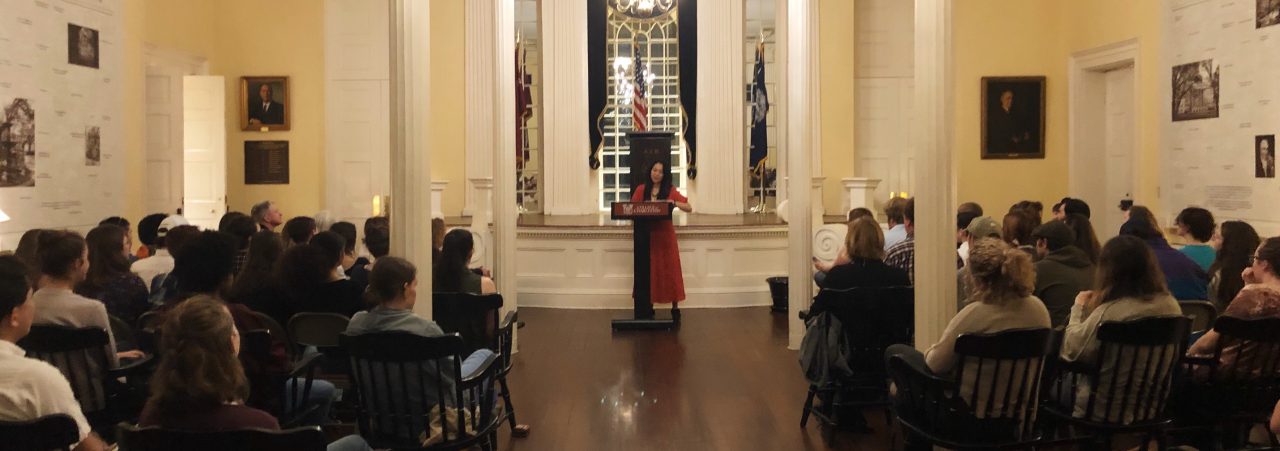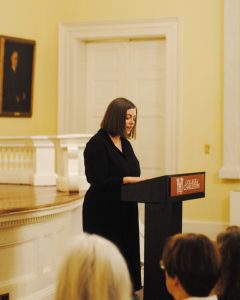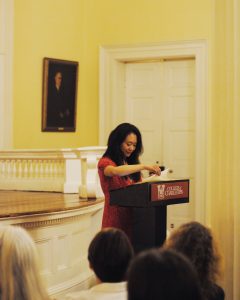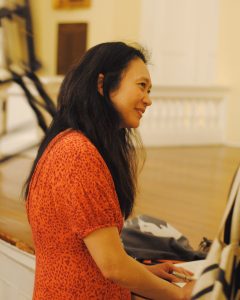
Jennifer Chang: Closing the Distance
February 28, 2019 | blog, news, readings

By Katelin McLaren (Poetry ’20) and Dakota Reed (Poetry ’20)
On Thursday, February 21st, visiting poet Jennifer Chang read from her book Some Say the Lark for the third Crazyhorse reading of the academic year. First year poetry student Kat Smolinsky introduced Chang by inviting the audience to “come together to listen to and affirm a beautiful reality.” She noted that Chang “spins poems out of vibrant threads of language,” and that her poems “leap towards some great unknown, reaching for a feeling of understanding and kinship.”
Some Say the Lark, Chang’s second book following The History of Anonymity, was longlisted for the PEN Open Book Award and won the 2018 William Carlos Williams Award. Her poems have appeared in American Poetry Review, The Nation, The New Times, The New Yorker, and Poetry, and her essays have been published in Los Angeles Review of Books, New England Review, New Literary History, and The Volta. She is currently an associate professor of English and creative writing at George Washington University, and a distinguished visiting poet at the University of Houston for the Spring 2019 semester.
Chang began the reading with her poem “The Winter’s Wife.” “It will be years before I understand / failure […] I can learn / to make shade with my palms, / but I cannot learn to unmoor my want.” Her voice drifted throughout the room and demanded attention. The audience was compelled by this unmoored want and Chang’s soft delivery of lines like “I am the fool that has faith in Never” from “A Horse Named Never.” However, her voice easily adapted to fit the tone of her poems. “The daffodils can go fuck themselves” she read loudly with a smile, from her poem “Dorothy Wordsworth.” She went on to garner laughter with the line “If I died falling from a helicopter, then / this would be an important poem.”
Moving through her collection, Chang prefaced her reading of “How to Live in an American Town” by noting “Sometimes a poem is like a weather system, you just have to push through it.” She went on to put her poems “It Was Your Birthday Again” and “Lost Child” in conversation with one another, identifying them as being about a childhood friend she grew out of touch with. Chang pushed through barriers of time, longing, and distance to bring these poems and her own reflections on the past together, inviting her audience to witness as she calmly read “Farewell, / we say to the past even as our voices / tell me that speaking is religion.”
“It is not good to think / of everything as a mistake,” Chang quoted from “Again a Solstice,” one of the last poems she read, “We swim in glittering murk. / I tread, you tread.” She brought her listeners into the poem, into the experience as she wrapped them in her “vibrant threads of language” to guide them through the murk. She spoke softly and deliberately as she posed a final, resonating question “What does it even mean to write a poem? / It means today / I’m correcting my mistakes. / It means I don’t want to be lonely.”
Following the reading, Chang answered questions regarding her writing. When asked about her revision process, she discusses the cleanliness of poetry. She explains that after writing a poem, if she feels it is too neatly tied together, she revisits it and manipulates or adjusts certain lines and structures to eliminate that sense of orderliness. She partially attributes this to her desire to “break things” and expands upon this idea of maintaining control while still being evasive in order to complicate a clean ending.



